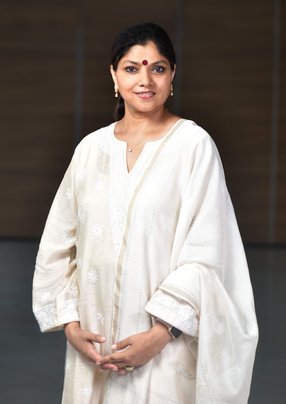
Vaishali Nigam
Following a successful start to her career as an investment banker in the US, Vaishali Nigam became the Co-Founder and Sustainability Chairperson of ReNew—an organisation that is helping decarbonise India through renewable energy engagements.
Alongside her role at ReNew, Nigam works closely with industry bodies and think tanks to address the climate challenge from her angle in the clean energy sector—as a board member of the UN Global Compact Network, acting chair of its Gender Committee, as well as being the chair of the Confederation of Indian Industry’s National Committee on Women in Energy.
Expressing the importance of ESG in her work, and that of ReNew, we ‘sat down’ to learn more about India’s sustainability trajectory, and ReNew’s influence on the industry.
What's the current energy landscape in India in terms of renewable energy capacity?
India, as the fastest-growing major economy, is making significant strides in the renewable energy space. Currently, India is ranked fourth in the world for installed capacity of renewable energy (including large hydro), amounting to 179.322 gigawatts. In 2022, we witnessed the highest year-on-year growth in renewable energy additions of 9.83%. The Indian government is also actively promoting the addition of a substantial amount of renewable energy capacity in the coming years, with the aim of installing 500 GW of renewable energy capacity, requiring India to add about 50 to 60 GW every year until 2030. This target positions India to become one of the world’s leading renewable energy economies.
However, there is a common misconception that India’s growth has been driven by coal. Over the last decade, India’s renewable energy function has been on a highly accelerated trajectory, which has been driven largely by our country's leadership and supported by a thriving private sector of which ReNew is a part—and often a pioneer.
It was recently reported that India’s greenhouse gas emissions rate dropped 33% over 14 years, largely thanks to the exponential growth of the renewables sector in the country. Prime Minister Narendra Modi has set forth an ambitious objective for 2030, and in addition to the 500 GW of renewable energy capacity, India is also looking at a 45% reduction in the emissions intensity of the economy.
How is the country and its organisations responding to the demand for renewable transition?
India’s response to the demand for the renewable transition is multifaceted, involving a combination of a positive policy environment, private sector investment, technological innovation, and international collaboration.
India is experiencing a swifter expansion of renewable energy compared to many other major economies, with new capacity additions expected to double by 2026. On top of that, India’s shift towards clean energy is already well underway. The country has surpassed its commitment made at COP21 in Paris by achieving 40% of its power capacity from non-fossil fuel sources, nearly nine years ahead of schedule.
India has been responding to the demand for the renewables transition in several ways. Constructing solar power plants has become more cost-effective than that of coal facilities, thanks to advancements in technology, consistent and supportive government policies, and a robust private sector.
The government is also playing a crucial role in the support of the industry. The Production Linked Incentive (PLI) scheme in solar PV manufacturing was introduced by the government with financial outlays amounting to INR 24,000 crore to enhance manufacturing capabilities, increase exports, and generate jobs. In addition, the Indian government authorised US$2.3bn in January to boost the green hydrogen sector, aiming to establish India as a worldwide centre for sustainable fuel.
ReNew specifically is making huge strides in the green hydrogen space. Last year, the company signed a Framework Agreement with the Egyptian Government to establish a green hydrogen plant in the Suez Canal Economic Zone, which aims to produce 220,000 tonnes of green hydrogen annually. Further, it has also set up manufacturing facilities in Gujarat and Rajasthan for solar cells and solar modules.
Why is it so important to have female representation in the energy sector? What will this bring to the renewable transition?
The journey towards a greener future goes beyond just environmental concerns. While these types of concerns are a crucial aspect of businesses’ efforts to reduce carbon emissions and promote sustainability, it is equally important to prioritise the well-being of individuals. We must guarantee that the shift to green energy is fair and inclusive for all communities, particularly those most susceptible to the effects of climate change in underdeveloped nations. In addition to this focus, we certainly must include women in this transition, through education, advocacy, and leadership.
On a global scale, we are not looking only for a renewable energy transition. We are looking for a just energy transition, and in order for the energy transition to be fully credible and just, we must ensure that women and marginalised groups are not forgotten as we continue to advance this journey. It is critical that women are involved in the renewable energy transition, from policymakers to government representatives, all the way to site leaders.
The renewable energy sector is only growing larger, and this means that the need for skilled workers will continue to increase. IRENA estimates that 38 million employees will be needed by 2030 to reach and deliver global climate commitments. Increasing the amount of female representation in the renewable energy sector has double benefits: increasing the size of the workforce while simultaneously bridging the gender gap currently faced in this sector.
What hinders female representation in the industry?
The United Nations reports that 80% of people who are displaced by climate disasters are women, however, their representation in the clean energy industry is minimal, at around 32% globally, and just 11% in India. Around 34% of women in the workforce are in corporate functions and only about 1% of women occupy jobs in operations and maintenance or core STEM roles.
Women have historically not been drawn into areas of sustainability and renewable energy, which has its roots in traditionally male-dominated sectors, like engineering. This lack of a female presence could be caused by societal expectations similar to that of women in STEM or cultural issues that hinder women from entering the workforce. Over the years, this has led to a lack of diversity in the talent pool and created an environment where women may feel like outsiders.
Looking back at my early adult life, a large majority of women did not go to engineering colleges due to the lack of available hostels for them to stay in, which raised security and safety issues. The combined effect of the enabling environment and the cultural environment prevented women from getting into STEM careers.
How will ReNew help overcome these challenges?
I am committed to driving not just positive environmental impact, but positive transformation on the societal scale as well. My work at ReNew has been hyper-focused on increasing and advancing the roles that women play in the renewable energy transition, not just in India, but across the world.
At ReNew, we believe that diversity, equity, and inclusion are integral to our success as a pioneer in the renewable energy industry. Fostering an environment that celebrates diversity and encourages inclusion is our responsibility. Our aim is not to just bring in more women but to make sure they feel included and respected by their seniors and peers. We have observed a seamless transition of women from enabling roles to core decision-making roles, where they contribute significant value to our organisation across various fields. We have enabled our talent acquisition team to bring in an increasing number of female graduate engineer trainees and diploma engineer trainees into STEM roles. Members of the senior leadership team at ReNew have DEI targets which help us track progress better.
We continue to take concrete steps to improve our diversity quotient. We have a long-term target of achieving 30% gender diversity in our workforce by 2030. We are already at around 16%, which is significantly higher than the industry average in our sector.
Under our Women for Climate initiative, I developed and launched Project Surya in partnership with the UNEP and Self-Employed Women’s Association of India, a first-of-its-kind project to train thousands of salt pan women workers in India and enable them to get roles in the clean energy sector. This initiative enabled these women workers to obtain the necessary skills needed to not only take on higher pay, safer working conditions, and a path towards socio-economic mobility but also to play an active role in the renewable energy transition.
In addition to Project Surya, I also developed and led ReNew’s Women Climate Champions program, an entrepreneurship development platform, which selected six female entrepreneurs to receive bespoke 1:1 mentoring sessions with senior sector experts, strategic peer learnings, and capacity-building activities. Closely aligned with the UN Sustainable Development Goals, the entrepreneurs were also educated to ensure that the work they conduct will have a positive ripple effect and leave a sustainable legacy.
Beyond business, our programs have focused on re-skilling women in energy job roles.
Featured Interviews
“It’s about turning it beyond building that market awareness; beyond that education to actually go after tangible, measurable, replicable claims”






